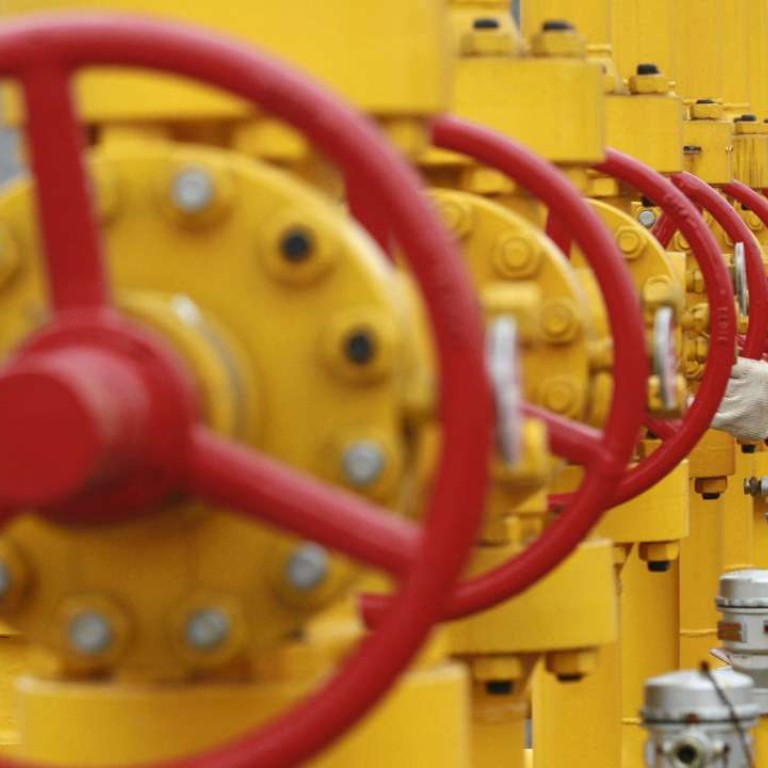
China poised for pick up in oil and gas pipeline construction after prolonged lull
Chu Kong short-listed as potential supplier to a 200bn yuan, 8,972km Sinopec gas pipeline project linking Xinjiang with Zhejiang and Guangdong
Oil and gas pipelines suppliers are poised to benefit from faster pipelines construction after over three years of falling orders, industry reforms and a prolonged anti-corruption drive that saw major management reshuffles at the nation’s biggest state oil and gas producers, according to the head of a major supplier.
Chen Chang, chairman of Guangdong-based Chu Kong Petroleum and Natural Gas Steel Pipe, one of China’s largest producers of processed steel for oil and gas pipelines, said there are already early signs of a recovery in the sector.
“There has been a pick-up in activities, and Sinopec especially may be recovering faster than others,” he told the South China Morning Post in an interview. “We view that as a prelude to what may be coming.”
Chu Kong has recently been short-listed for consideration as a potential supplier to a 200 billion yuan project that is hoped to turn coal into natural gas in Xinjiang Uygur autonomous region. which will then be transported via a 8,972-kilometre pipeline to markets in Zhejiang and Guangdong provinces planned by China Petroleum & Chemical (Sinopec).
Chen said the project is considered as one of the main gas pipelines planned in the 2016 to 2020 five-year industry development plan released in mid January by industry regulator, the National Development and Reform Commission (NDRC).
A senior official at the project’s would-be building contractor Sinopec Engineering, who declined to be named, said although the project had been approved by the NDRC late 2015 after the completion of feasibility studies, the exact timing of construction is hard to gauge.
“While Sinopec, the project owner, has set up a project management committee after approval was given, there is no news on its further development,” he told the Post.
There has been a pick-up in activities, and Sinopec especially may be recovering faster than others. We view that as a prelude to what may be coming
“Preparation of supplier short-lists is one thing, but what’s key is watching when upstream coal-to-gas facilities kick-start construction, which will precede the building of any gas pipeline.”
A major reason for the delay in the construction of oil and gas pipelines is the introduction of wider domestic industry reforms that will see the separation of the country’s three state-backed oil and gas giants’ pipeline operations from their upstream oil and gas production business – a move officials claim will lead to greater efficiency and lower energy costs for consumers, he added.
The three are PetroChina, China Petroleum & Chemical (Sinopec) and China National Offshore Oil – parent of listed offshore oil producer CNOOC.
All were asked by Beijing last October to separately report the financial performance of their pipeline operations, calculate their operating costs, and whether they could facilitate the opening of pipeline assets for third-party usage, and oil and gas field investment and energy products trading. The pipelines’ return on investment has also been capped at 8 per cent.

Access to pipelines is key to attracting investment by firms other than the three state companies themselves, in an effort to break up their dominance of the nation’s oil and gas production industry and promote greater operating efficiency.
Amid the industry reform and an ongoing anti-corruption drive that began in 2013 which saw many high-level decision makers at the state-backed energy giants removed from their posts, oil and gas pipeline orders tumbled.
Chu Kong saw its revenue from Chinese customers fall from 2.86 billion yuan in 2012 to 1.67 billion yuan in 2013, to 1.31 billion yuan in 2014 and 1.19 billion yuan in 2015. The figure for the first half of 2016 sank another 23 per cent year-on-year to 348 million yuan.
Shandong province-based rival Shengli Oil & Gas Pipe also saw its combined domestic and overseas pipe sales plummet from 1.43 billion yuan in 2012 to 445 million yuan in 2015.

The falls left the government well short of reaching its national pipeline targets for 2015. Only 8,000 km of crude and refined oil pipelines were added in the five years to 2015, compared with the planned 29,400 km, and 21,400 km of natural gas pipelines were built against a target of 40,000 km.
Beijing’s latest plan calls for 17,000 km of crude and refined oil pipelines and 40,000 km of gas pipelines to be built in the five years to 2020.
Chen said trial production has taking place since 2015 at its US$200 million, 300,000 tonne/year steel pipe plant in Saudi Arabia, although it has yet to receive any orders as it is still pending quality certification by its major would-be customer, oil and gas giant Saudi Aramco.
It already has American Petroleum Institute certification.
Its local Saudi joint venture partner is Abdel Hadi Abdullah Al-Qahtani & Sons, the world’s third largest pipe coating company.
Chen added that the company’s shareholders late last month approved plans to form a 2.5 billion yuan steel plate joint venture with Fangyang Group, which is owned by the municipal government of Lianyungang, Jiangsu province.
Located in the coastal Xu Wei new area in Lianyungang, 200,000 tonnes of the plant’s annual designed capacity of 2.16 million tonnes of carbon and stainless composite steel plates will be consumed by Chu Kong’s own oil and gas steel processing plants in the area, he said.
The rest will be used to make products for customers that make water pipes, vehicle wheels, bridges, roads and marine engineering products.

